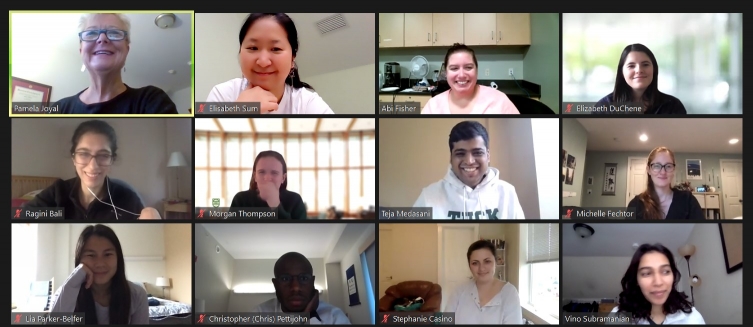
Rewind to October 2019, my first year of Tuck. Despite my initial worries, I’m well into making friends, taking on club leadership commitments, surviving core classes, feeling like I’m finally hitting my stride of writing this exciting new chapter of my life called Tuck.
And then comes the bad family news, news about my parents’ health I had been dreading since I started my MBA program. With that one call, on top of exams, on top of recruiting, control over my world was like sand, slipping through my fingers.
Trying not to draw attention to my problems, I tried to socialize more with classmates, overcompensating as if I wasn’t coming apart at the seams of my smiles, which only made me feel worse because all I wanted was to scream at the top of my lungs. I wasn’t sure how to cope through juggling a crisis with an MBA program, so I stayed sewed shut until I reached my breaking point of depressive thoughts.
Today, celebrating National Emotional Wellness Month this October, my mind drifts back to one year ago where I underwent a personal crisis, one of many crises I would be facing during my MBA, and how alone I felt.
But more so, I reflect on this simple, often forgotten fact: I was not and am not alone in having these scary, frustrating, and seemingly helpless experiences. It’s no secret that business school is hard. Transitioning to a new place, acclimating to a rigorous academic program, recruiting for a job with no experience, just trying to fit in and find your place in an unfamiliar environment—these are all natural triggers.
And what brings me back from those breaking points, are my Tuck friends. I still remember crying in my dorm room with Louisa Chen (MD/MBA), about what to do about Tuck and my family situation, and she said, “If I told you today you couldn’t leave Tuck to solve what was going on with your family, how would you feel?” That was all the clarity I needed. Not even 24 hours later, I put exams on hold, cancelled all my Tuck plans, flew back to California, and addressed my most important priority, family.
Why were those words so impactful? Because Louisa had been through it before. Opening up to my Tuck friends, having their lived experiences help work through mine, is how over and over throughout the past year—especially during the pandemic—I find myself able to claw back from those dark corners of my mind.
We all have struggled or will struggle at some point in life, and we can find strength in the support of others with lived experience. We can all find strength in our peers.
The words “peer support counselor” sounds so formal, but it means simply, “I am a voice for the feelings my classmates are experiencing during a crisis.” Most times, during a personal crisis, there is a chaos of emotions, ones you are experiencing but don’t know how to describe. It’s often easier to talk about what thoughts you are having than it is to identify in words how you are feeling.
Therein is the value of a peer counselor. We all have our own personal experiences with mental health, allowing us to identify, relate to, and support our community on a peer-to-peer level. To me, it means offering social and emotional support, by listening and encouraging the peers who come for a helping hand and a sympathetic ear. It means sharing the courage I discovered in my own low points to help Tuckies work through their low points, even if it means seeking more formal resources.
This desire to create a peer support counselor program at Tuck did not start off grand. I was supporting friends long before I knew there was a title, or specialized trainings – let alone a structured way to use my lived experiences of imposter syndrome, family issues, self-harm and eating disorders, and suicide, as “tools” to assist others on their mental health and emotional wellness journey. “I know what you are going through because I have been there.”

As part of their peer support counselor training, thirty Tuck students have completed their Mental Health First Aid and Suicide Awareness and Prevention trainings led by Dartmouth CARES.
What catalyzed this into a formalized program at Tuck was realizing that, frankly, Upper Valley mental health resources are not scarce, but they are limited. I remember calling therapists only for automated phone calls telling me there was a 6-month waitlist and that if I didn’t have substance abuse or wasn’t in imminent danger, I was a “lower” priority.
Low points during an MBA program don’t wait 6 months. They don’t even wait 24 hours to take a hold of you and drag you down. Dark thoughts of helplessness escalate when pain exceeds your “perceived” resources for coping with pain. And though there are strong resources available around Tuck, Dartmouth, and the community, there’s just not enough capacity.
My humble dream for launching a peer support counselor program under the Mental Health and Wellness Initiative at Tuck is for Tuckies to be a welcomed additional resource for our classmates. I want to break through stigmas—let’s have a heart-to-heart about our mental health and the struggles we all go through. Currently, 30 Tuckies are completing their Mental Health First Aid Training (certified by the National Council for Behavioral Health) and their Suicide Awareness and Prevention Training led by Dartmouth CARES. The thoughtful and raw conversations I see happening in these trainings make me so proud and emotional to be a part of this Tuck family.
Especially during these challenging, strange times, I hope by extending our trained, informed, empathetic hands to our classmates who needs us, many more people like myself can find their light through these seemingly endless tunnels.
Contact a Tuck peer support counselor
About the Mental Health and Wellness Initiative at Tuck
Started as a grassroots effort by students in early 2020, Tuck’s Mental Health and Wellness Initiative (MHWI) was created under the vision of a revolutionary approach to mental health at Tuck. The pillars are to increase awareness and visibility and advocate for more resources for wellness and mental health for the Tuck community. The MWHI is led by Louisa Chen MD/MBA T'21 and James Ozturk T’21.

Prior to Tuck, Elisabeth Sum T’21 worked at a regulated utility in California as a chief of staff leading large-scale transformation projects. At Tuck, she is a Forte Fellow, elected Student Board Social Chair, and a Revers Center of Energy Fellow. She is also the co-chair for Tuck’s Diversity Conference, Tuck Mentors, Tuck Follies, Tuck GIVES, a Tuck Admissions Associate, and the lead for Tuck’s Mental Health and Wellness Initiative Peer Support Program. Post-Tuck, Sum will be joining Altman Solon as a senior consultant.